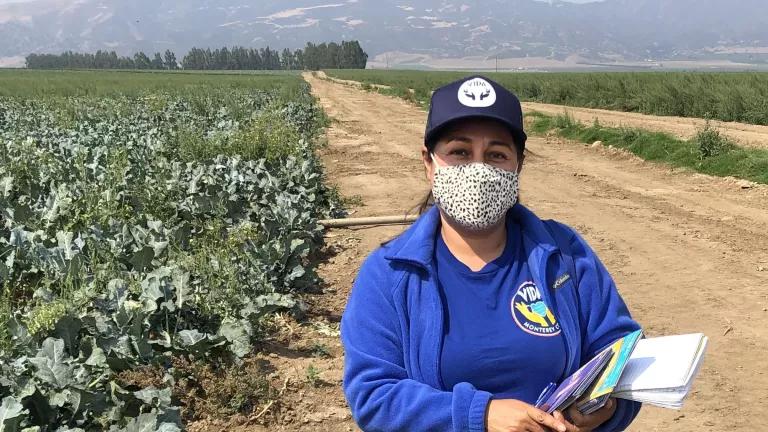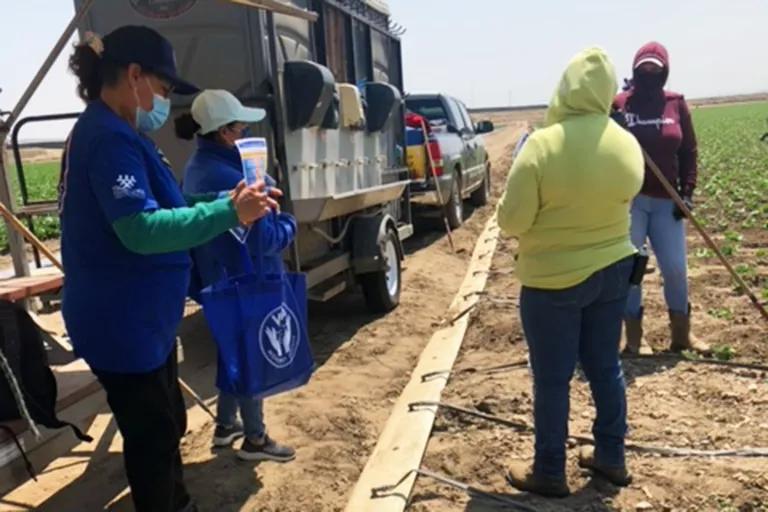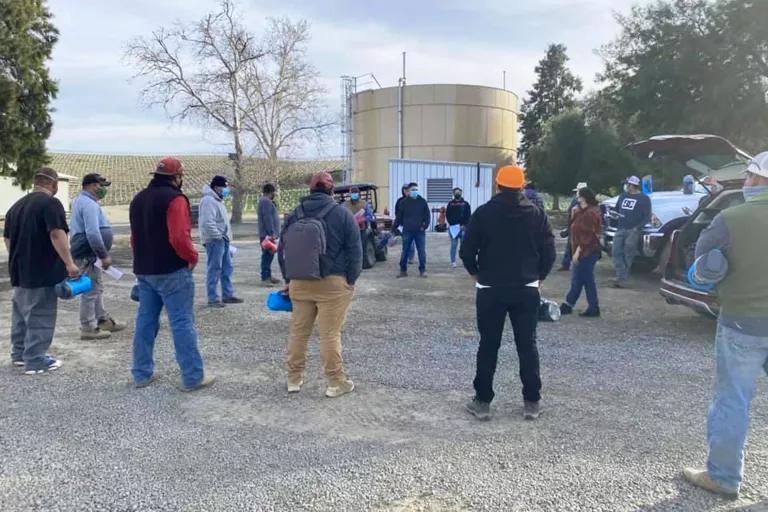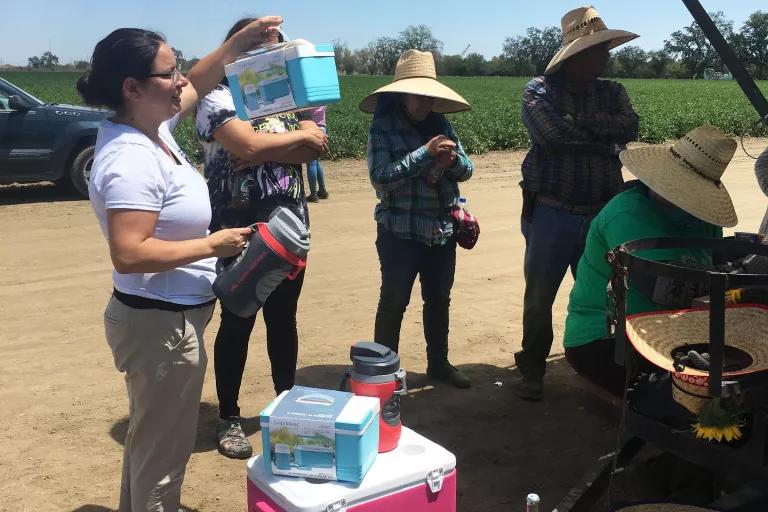Latina Farmworkers Speak Out about the Hazards of Life in California’s Fields
From farms to public hearings, the women of Líderes Campesinas are standing up against the pesticide exposure, COVID-19 risk, and other threats disproportionately impacting their community.

Araceli Ruiz, a farmworker in California’s Salinas Valley, on a field distributing information about pesticide exposure to other workers
Araceli Ruiz has been harvesting fruits and vegetables in California’s Salinas Valley, a region known as “the salad bowl of the world,” since she arrived in California from a small town in central Mexico at 19. While the 43-year-old mother of three is proud of her hard work, the job’s hazards have taken a toll.
Throughout most of her third pregnancy, Ruiz toiled in the fields, places where pesticides had often been sprayed mere hours before. “It wasn’t a safe working environment, but I had to do it to provide for my family,” she says. Her son, now 14, has experienced physical development delays and suffers from asthma and various digestive disorders—issues doctors confirm are a result of pesticide exposure in utero. (In addition to their impact on the developing brain, pesticides have also been found to reduce birth size and weight.) “I see pesticides’ impact firsthand with my son,” Ruiz says.
About six years ago, she decided to share her story with other farmworkers. After linking up with the Greenfield chapter of Líderes Campesinas, a network of about 500 women and girls spread among 14 local chapters in California’s biggest agricultural centers, she began warning the community about the dangers of pesticide exposure.
With the group’s support—advocacy around the dangers of pesticides has been a prominent issue for Líderes since its founding in 1992—Ruiz distributes canvas bags with pamphlets and sets up information tables in the fields, where workers can feel safe asking questions. The pamphlets detail the problems that can stem from acute herbicide and insecticide poisoning, including nausea, headaches, shortness of breath, and seizures, as well as the longer-term risks: chronic illness, cancer, and neurological disorders. While the data is surely incomplete—as the Pesticide Action Network notes, undocumented workers rarely report poisonings—more than 300 farmworkers did report incidents in California in 2017, an alarming increase from previous years. Ruiz describes the reception to her educational efforts as positive, and many workers have been grateful to learn about the dangers they face. She says, “It was an eye-opening experience for a lot of the people I informed. Many of them didn't know.”

Audelia Garcia Cervantes, a former farmworker and current board president of Líderes Campesinas, originally joined the group after losing her husband, also a farmworker, to a condition his doctors linked to pesticide exposure. Devastated by his death and suffering from her own health conditions, such as chronic asthma and psoriasis, she found support among the Líderes women who could relate to her story.
Together with other members, Garcia went on to advocate for a state ban on chlorpyrifos—a widely used and highly toxic pesticide that poses especially high risks to children—by writing letters, attending rallies and hearings, and participating in panels, where members shared personal experiences of how the chemical hurt them and their families. Their efforts paid off: California, which had accounted for approximately 20 percent of the chlorpyrifos used nationwide, agreed to phase out all spraying of chlorpyrifos in the state by the end of 2020. The success also laid the groundwork for bigger change: In August, after decades of pressure, the federal government followed the state’s lead by banning chlorpyrifos on food grown in, or imported to, the United States. “We wouldn’t have won the ban without everyone—including national organizations like the Alianza Nacional de Campesinas—working together,” Garcia says. (Alianza Nacional de Campesinas’s cofounder and executive director, Mily Treviño-Sauceda, also cofounded Líderes Campesinas.)
Líderes’ pesticide advocacy (which remains an ongoing battle, given the widespread use of these chemicals) is part of the group’s tradition of driving change to guarantee farmworkers’ basic needs and fundamental human rights. Because many workers are undocumented, might not have much formal education, or have been conditioned as women to feel their ideas aren’t valuable, the group provides a safety net for support and validation of shared experiences. “As we’ve gotten bigger and stronger, more and more women have been able to lift their voices,” says director of operations Irene de Barraicua. Líderes members have also organized around issues like domestic and workplace violence and gender discrimination.
Most recently, the group has focused on those injustices in their community that have been exacerbated by the COVID-19 pandemic, including unsafe living and working conditions (made worse by the climate crisis), low wages, poor job security, and vulnerable immigration status. Despite the serious risks throughout the pandemic, Ruiz and her fellow farmworkers continued to show up to work, where their employers often took inadequate responsibility for their care, failing to provide sufficient personal protective equipment, like masks and gloves, or to put social distancing measures in place. Many workers continued to toil in groups of up to 60, harvesting produce side by side. Since the pandemic’s start, the virus has infected more than 70,000 agricultural workers in California, representing more than 9 percent of all cases in the state.

So Ruiz and her Líderes colleagues took matters into their own hands. They distributed masks in the fields, informed workers about safety protocols, and delivered food to quarantined community members. By the end of 2020, their pandemic response focus shifted to vaccination efforts. As part of the VIDA (Virus Integrated Distribution of Aid) Community Health Worker Program, more than 100 community health workers, including Ruiz, have been distributing information about COVID-19 testing and vaccinations, and encouraging reluctant farmworkers to take advantage of the crucial protections the shot affords. She is proud to have worked at a pop-up vaccination center, one of dozens staffed by Líderes members across Monterey County, where at least 4,000 local residents were immunized against the virus.
“COVID-19 has shown just how valuable our network is—and the importance of continuing to grow,” de Barraicua says. “You really need the very people from the community, the most impacted communities, in order to get past this pandemic.”
Indeed, the women farmworker leaders have been working tirelessly over the past year and a half to make sure that people across the United States have food on their tables and that their coworkers and communities remain as safe as possible. But even as their roles are celebrated as essential, many still live in fear as undocumented immigrants, worried about deportation and getting sick without basic benefits like health care.
“We’re here and doing all this work, but we are not given the path to be here legally and raise our families without the fear of it one day being ripped apart,” Ruiz says. “It would definitely be appreciated if our government also saw us as essential.”

Suguet López, executive director of Líderes Campesinas, acknowledges that her community has gained increasing recognition since the virus first took hold, and that it reminded us of the ways in which all of us, across the country and planet, are connected. But, she says, “we just hope that this new idea of farmworkers being essential holds on beyond the pandemic, and that we really recognize their humanity. They are essential to the economy and bringing food to our tables, yes. But they are also essential to their communities and to their families. They are essential as human beings.”
This NRDC.org story is available for online republication by news media outlets or nonprofits under these conditions: The writer(s) must be credited with a byline; you must note prominently that the story was originally published by NRDC.org and link to the original; the story cannot be edited (beyond simple things such as grammar); you can’t resell the story in any form or grant republishing rights to other outlets; you can’t republish our material wholesale or automatically—you need to select stories individually; you can’t republish the photos or graphics on our site without specific permission; you should drop us a note to let us know when you’ve used one of our stories.

If You Care About Climate Change, Then You Care About the Farm Bill
Three Ways We Can Make Schools Healthier This Year
Washington State Adds Emergency Rules to Protect Workers from Heat and Wildfire Smoke